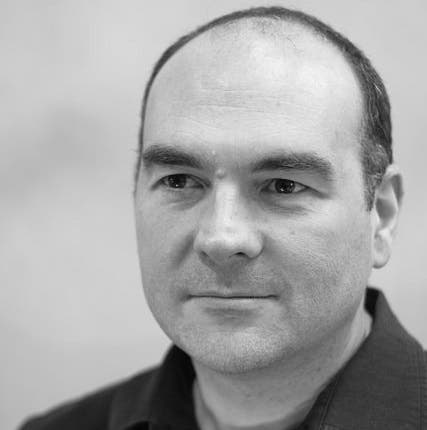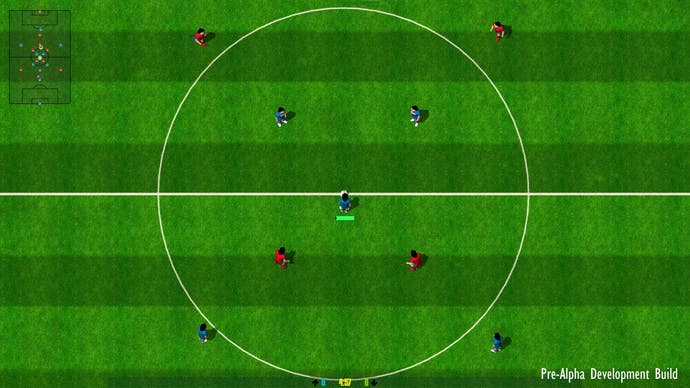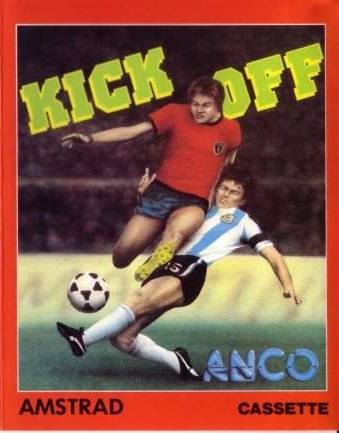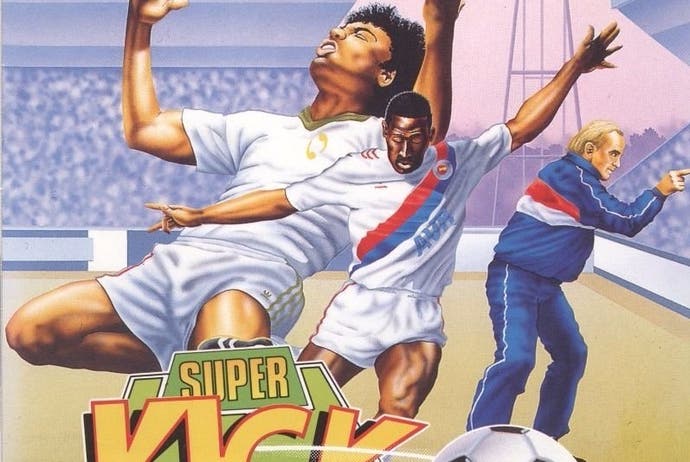Making peace with the monster: The return of Dino Dini
Kick Off's creator on coming back for some unfinished business.
Some tensions never let up, even after well over 20 years. Do you remember the battle between Kick Off and Sensible Soccer? For most of us it was one of countless 90s playground spats - SNES vs. Mega Drive, Blur vs. Oasis - that's passed into the irrelevance of childhood memory. For Dino Dini, it remains a little more personal than that.
If you're of a certain vintage, you'll doubtless have heard of Dini - a man who, for a long while, was synonymous with the football genre, whose name was drawn in neat black type across the top of games boxes that played a part in millions of childhoods. It's one of those monikers embedded within the wonderful wizardry of 90s computing, when developers were able to put a proud stamp on their work - Geoff Crammond's Grand Prix, Sid Meier's Civilization - that gave them a strange kind of aura. The kind that gives you a jolt when they're suddenly rolled out during the middle of an otherwise unremarkable showcase of PlayStation games.
I'll admit it caught me unaware. Halfway through a Sony event highlighting its forthcoming downloadable slate for PlayStation 4 - games such as Housemarque's fine looking Alienation, the weird juvenilia of David Jaffe's Drawn to Life and Kill Strain, a game with a title so forgettable it took me some 30 minutes stoking search engines trying to recall exactly what this intriguing MOBA is called - Dini's given the stage to present his grand comeback, Dino Dini's Kick Off Revival. A few minutes later I'm sat on a sofa playing it with him, relishing in the sharp tang of nostalgia that comes with playing a brilliantly tactile football game that's faithful to the originals.

Minutes after that, I'm sat in a meeting room with Dino Dini - Dino Dini! - realising I'm woefully unprepared for the interview I've just requested. I know of the man, and I know of his work, but in truth I only really remember playing Kick Off on a dog-eared Game Gear, tethered to the mains socket in my bedroom in order to circumvent its infamous appetite for AA batteries. I tell Dino that was the portable version was the one I'm most familiar with, and he politely points out it was a port he had no input in, and one he's not overly happy with. It's not the best possible start. So, let's ease our way in. What's it like being back after all this time away?
"It's nerve-racking," says Dini, who in truth doesn't seem at all nervous - rather, he seems genuinely enthused to be back, and to be talking to press again. "There are hundreds of tuneable variables. It's a bit like sculpting in numbers. And you don't know how it's going to work out. But so far the reaction has been good. It's achieving what I want it to, I think."
What is it that Dini set out to do? Put simply, it's a wholehearted return to the original ethos of Kick Off. The ball's a separate entity to the player, and it requires a rewiring of a brain more accustomed to modern football games to grasp even the fundamentals. And why not return to the old style? It had its fans and - as Dini pointedly dwells upon at the head of his on-stage presentation - they had their plaudits, winning two Golden Joystick awards back in the day. "The thing is, what I did back then worked, didn't it? I'm trying to make sure I bring that spirit back. We call it revival, because it's more about just bringing Kick Off back. It's more of a mission. There's this new era of video games, it started a few years ago with indie coming back, and it's about going back to what we lost. It might sound grandiose, but it's my contribution to that effort."
What is it, exactly, that we lost? "Video games used to be about you versus you. Even when it was a competitive game - all the great games. I had a stepson, and I watched him playing a Mega Drive game. What was he doing? He was battling with himself. That's what inspired me, with Kick Off. What was I playing at the time? Things that influenced me were things like Star Raiders, Space Invaders, Pac Man. They all have one thing in common - in the end, the more you practice, the better you get. When you get close to your high score, things ramp up a notch. that's the central thing to the addictiveness of coin-op games, arcade games. We've kind of lost that."
For over 20 years, we kind of lost Dino Dini too. In 1994, Virgin Games released Dino Dini's Soccer on the Mega Drive - alongside Electronic Arts very first FIFA, somewhat fatefully - and since then it's been a story of near-misses, games that never quite made it to market. The momentum built up working with publisher Anco on Kick Off soon came to a crushing halt. "I reached the top of the industry as a nobody, then I became a nobody again, because I was unable to capitalise on what had happened. What did I do? I had problems with Anco, and I had to leave - and they kept the Kick Off name, which was like a disaster. It's like I'd written a best-selling book, and then was unable to continue my best-selling series. It just doesn't happen to authors! But it happened to me, because the video game industry is kind of weird."

Where has he been doing in the 20 years since? "Some would say wasting my life, I don't know! I was born to do this, and I couldn't after 1996." Following the fallout with Anco, Dini fell foul of a market that was moving away from PC and towards console thanks to the success of Sony's PlayStation, and found himself moving to America to work directing projects for bigger teams. A comeback of sorts was mooted at the turn of the century, first for an Italian developer and then for a Canadian studio, though both games ran out of money before they could come to market. Dini has since spent the past few years in the Netherlands, teaching game programming at a vocational university in the city of Breda.
Dini's comeback was orchestrated, in part, by former Sony employee Shahid Ahmad, the man largely responsible for the indie drive that sustained the Vita and carried some of that momentum over to the PS4. Ahmad gave Dini a Vita dev kit, and the support helped push him forward with a new project. "I thought, 'Sony are being nice to me!' There was a period in the industry where if you didn't have a publisher behind you, you had x amount of marketing dollars, you couldn't make games. That's changed, and Shahid is a large part of that."
Dino Dini's Kick Off Revival isn't a big game - "I've gone from bedrooms to bedrooms, yeah," deadpans Dini - and its ambitions seem fairly modest. It feels like Kick Off, and it looks like Kick Off, a modest foundation with more planned down the line.
"The most important thing is the gameplay experience," says Dini. "If you look down the Player Manager route, it wouldn't be too surprising if I had plans to finally do a Player Manager 2 - even if I can't call it that - but I'm very proud of that game, and I want to do it justice and also upgrade and update it. These days, with online release on PSN, it's possible to upgrade the game. We can look forward to a number of DLCs, and I imagine a lot of them will be for free.
"What's really helped is the rise of indie. The industry's woken up to the fact that you can have a FIFA and a PES - they do what they do, which is to create a spectacle, and good luck to them - but what I do is totally different. It doesn't rely on high production values. It's about the sculpting, of the gameplay and the numbers, to make what I consider art."
With that little grand flourish I begin to half-remember the other, slightly flamboyant side of Dini, and some of his tortured history - the bizarre faked letter that appeared on the pages of Amiga Power in the 90s, a revert war on his own Wikipedia page and the strange comedy song that resulted, and of course the rivalry with Sensible Soccer - a conflict that, it seems, hasn't yet run its course.
"Another reason it's taken a while to come back, for a long time there was this difficult tension between Sensible Soccer, and it screwed with my head to be honest," Dini offers when I ask him whether he's now back for good. "It's not unusual - it happens all the bloody time. Look at what happened to Notch. Now he's a billionaire, but he proved he's a game developer, and he's not making games any more. What happened to the guy that made Flappy Bird? He proved he's a game developer, because he made a game that people were addicted to, even if it was a simple one. He almost gave up. You see this, and it's what I call the monster, and you have to figure out your relationship with the damn thing."
It sounds tough. Is he mentally prepared for returning to the spotlight?

"I kind of broke through a barrier," Dini replies. "It was a long, hard road, but eventually I broke through it, and only recently, I made peace with the monster, so now I can say it with only a little twinge of self-consciousness. It's tough. I was vilified in the press. It was like, 'What the hell?' I was a regular guy making a video game, and there was this whole Sensible Soccer vs. Kick Off. And if you read the comments of what people say, it screws with your head."
Given the animosity between the two, perhaps it's not surprising that it's only relatively recently that Dini met Jon Hare, the man behind Sensible Soccer, at his workplace. What is surprising is that some of that animosity still remains. "I'm walking down the corridor, and I see this guy and think, 'That's Jon Hare'. And I'll be honest, I never wanted to meet him. I walked past him and ignored him, but then a colleague called me over so I shook hands with him. So I shook hands with Jon Hare at work. I didn't say anything."
There was a second, only slightly more amicable meeting in a hotel lobby last September, when the two were in Poland for the gaming convention Pixel Heaven. "I thought Dino, this is an opportunity for you to deal with your monster - Jon's not the monster, the monster's what I created, to be perfectly clear - so I sat next to him and told him how I felt, that's all. How I felt about the whole thing, how I felt about what they'd done - that it's a clone, and the consequences of it to me personally."
The two rejoined later that evening on-stage for an impromptu performance of a track from the Cannon Fodder soundtrack, though looking back at it now you can sense some of that residual animosity. It's still there, too - shortly after Dini revealed his Kick Off revival, Hare launched a Kickstarter for a Sensible Soccer successor (which was cancelled soon after following a slow start to the campaign).
"It's a bit odd, isn't it? I find it odd. When he uses Jon Hare in the same font as Dino Dini with the black and white reversed. When he called himself the godfather of football games - no-one calls Jon Hare the godfather of football games, it's a tag they use with me.
"I'm just stating facts. This is what he did. I'm not going to judge it. I'm just going to say does that make sense? If one wanted to say it's just another football game, it could be just bad luck. But you could avoid using the phrase people used to apply to me, using the terms I invented and the same font on the logo. I'm not judging. I'm just saying. It's annoying, because is this going to be a repeat? And excuse me if I'm a bit nervous about it. I don't want to have a repetition - there are a lot of football games out there, and a lot of them inspired by my games, like New Star Soccer, there's another coming out called Super Arcade Football. I don't have any problem with those."
It's an old feud that, you sense in Dini's words, refuses to go away. How, I ask, can he enjoy his comeback. What would make him happy?
"That I just get on and release my game. That's it. Then I'll release another one afterwards. And carry on my career, really as, if I'd had my head in a better place 20 years ago, I would have been able to do. What makes me happy? Doing what I was born to do. And I have to defend it. That's my point. It's not dwelling on the past. It's protecting my past."
Dino Dini is properly back, then, and in its own way Kick Off is too. When it comes to PlayStation 4 and Vita this summer, it's set to be a pleasant reminder of a very different kind of football game. And it seems it's brought a little of the old drama back with it as well. "Talking about it is great," he says at the end of our time together. "What I've learnt is you've just got to say how you feel. If I'm being an arse, so be it. But at least I'm owning that."


